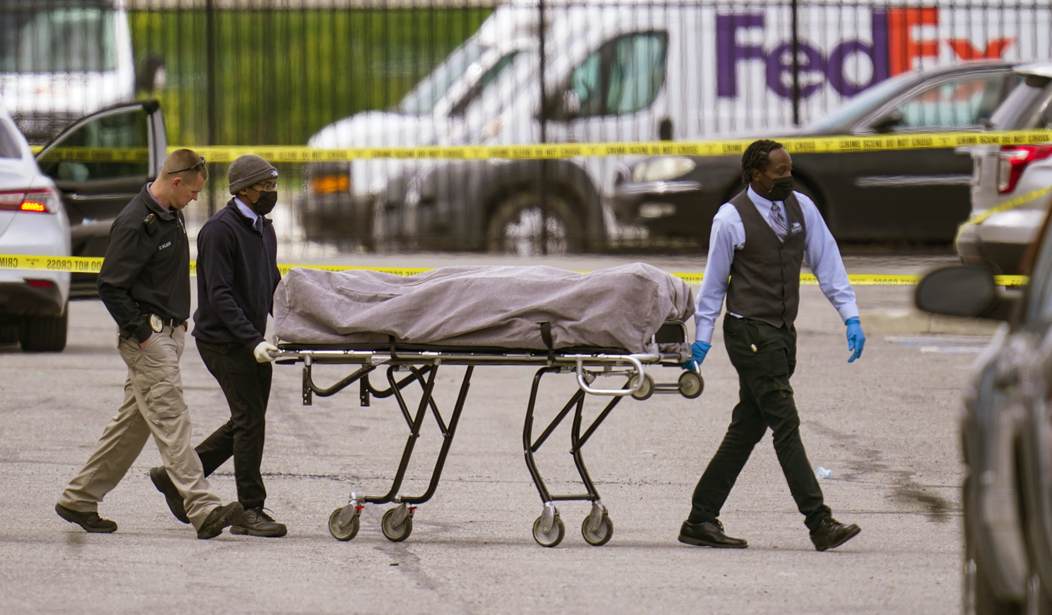How did the mass murder perpetrator in last week’s shooting at a FedEx facility in Indianapolis have the ability to buy his firearms? Both local police and the FBI had intervened a year earlier after his family warned law enforcement about his mental health, and police had seized his shotgun at that time. Shouldn’t that have initiated a hearing under Indiana’s “red flag” law to bar Brandon Scott Hole from acquiring replacement firearms?
It might have, the county prosecutor told the media today, had they pressed the red-flag case. Instead, Ryan Mears said, they stopped at the confiscation because prosecutors didn’t want to press their luck in court:
A former FedEx employee who shot and killed eight people at a FedEx facility in Indianapolis never appeared before a judge for a hearing under Indiana’s “red flag” law, even after his mother called police last year to say her son might commit “suicide by cop,” a prosecutor said Monday.
Authorities believed they had done what they needed to by seizing the pump-action shotgun from Brandon Scott Hole in March 2020, Marion County Prosecutor Ryan Mears said.
“Absolutely there needs to be some intervention and absolutely the firearm needs to be taken away. … But the risk is if we move forward with that (red flag) process and lose, we have to give that firearm back to that person,” Mears said. “That’s not something we were willing to do.”
The shotgun was never returned to Hole, police have said.
Mears added, “I think this case illustrates the limitations” of the law.
At the very least, one can conclude that this case illustrates the limitations of prosecutors. Essentially, they created the worst of all worlds in this outcome, even if their intentions were good. The decision to stop the red-flag process left them in possession of Hole’s property indefinitely, which is at some point an unconstitutional seizure without due process. On top of that, the failure to follow through on the threat allowed Hole to acquire more firearms, which made the confiscation useless anyway.
In fact, it’s tough to credit this explanation at all. If they thought that confiscation was necessary, then so was blocking future purchases. That’s why Indiana passed the “red flag” law in the first place — to allow prosecutors to legally intervene to end that particular kind of threat. Had they lost in court, they would have had to hand the shotgun back to Hole … but how is that any different from allowing him to buy more firearms legally? That was the clear outcome of Marion County’s decision to stop the process rather than seeing it through.
Red-flag laws have their own problems, especially in the ability to abuse them to prevent law-abiding citizens from owning firearms. However, no one can get any potential benefit from them if prosecutors won’t enforce them when it matters either. That also is the worst of both worlds, and in this case that decision had horribly tragic and deadly consequence.
Cam Edwards points out that the system failed the victims of the shooting in another way. How did Hole get out of his mental-illness hold so quickly?
Like most states, Indiana has a shortage of inpatient beds for those in a mental health crisis, and when the suspect was taken in on a temporary mental health hold in March of last year, there was also a push to clear out space in hospitals, jails, and other facilities to try to prevent the COVID pandemic from spreading in institutional settings.
Was that why the suspect was released after his temporary hold expired? We don’t know for sure but I wouldn’t be shocked if that was a factor. Had the suspect been deemed a danger to himself or others and been involuntarily committed, the state’s red flag law wouldn’t have come into play at all. The suspect would have been barred from purchasing any guns thereafter, but it appears that neither the red flag law on the books or Indiana’s civil commitment laws were ever fully utilized when the suspect’s mother reported him to police last year.
More gun control laws wouldn’t have made a difference here, but a fully functioning mental health system likely would have addressed the problem long before the suspect took a single life.
Before we start passing more laws to deal with potentially violent people, perhaps we should demand that police and prosecutors enforce the laws already in place. The FedEx mass shooting is a clear consequence of failure to use the legal tools at hand, no matter how advisable those tools might actually be.








Join the conversation as a VIP Member